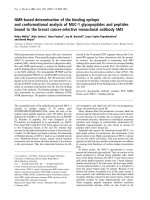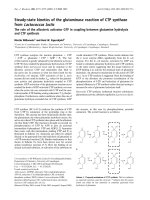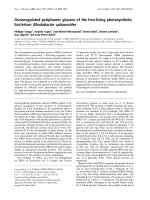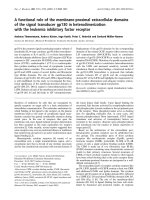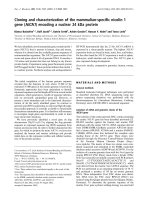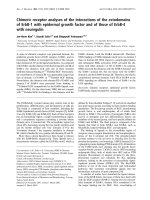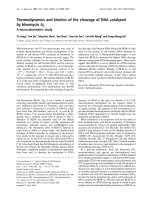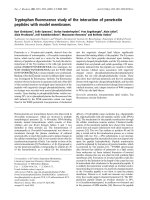Báo cáo y học: "Withholding selective decontamination of the digestive tract from critically ill patients must now surely be ethically questionable given the vast evidence base" pdf
Bạn đang xem bản rút gọn của tài liệu. Xem và tải ngay bản đầy đủ của tài liệu tại đây (176.06 KB, 2 trang )
LE T T E R Open Access
Withholding selective decontamination of the
digestive tract from critically ill patients must
now surely be ethically questionable given the
vast evidence base
Durk F Zandstra
1*
, Andy J Petros
2
, Nia Taylor
3
, Luciano Silvestri
4
, Miguel A de la Cal
5
, Hendrick KF van Saene
3
See related Journal club critique by Shibli et al., />Shibli and colleagues recently commented [1] on the
Dutch randomised controlled trial in which selective
digestive decontamination (SDD) and selective oro-
pharyngeal decontamination (SOD) were associated with
significantly lower odds of death as compared with stan-
dard care, with odds ratios of 0.83 (P = 0.02) and 0 .86
(P = 0.045), respectively [2]. We disagree with the
authors’ conclusion that, because there were similar
mortality reductions, SOD may be preferred as this
avoids routinely exposing patients to intravenous anti-
biotics and involves less resistance.
Cephalosporin consumption was higher in the SDD
group, but defined daily doses of penicillins, carba-
penems, quinolones and other antibiotics increased by
31%, 37%, 25% and 15%, respectively, in SOD compared
with SDD in the Dutch randomised controlled trial [2].
In citing the monthly point prevalence survey [3] of
the Dutch randomised controlled trial, Shibli and collea-
gues failed to mention that the average prevalence of
aerobic Gram-negative bacilli resistant to ceftazidime,
tobramycin and ciprofloxacin in the respiratory tract
was significantly lower during SDD/SOD than in the
pre-intervention and post-int ervention periods, and that
aerobic Gram-negative bacilli resistanc e to ciprofloxacin
and tobramycin in rectal swabs was significantly reduced
during SDD compared with standard care/SOD [2,3].
Finally, two recent meta-analyses evaluated the effec-
tiveness of SDD [4] and of SOD [5]: lower airway infec-
tions were significantly reduced by both SDD and SOD,
but only SDD was associated with a significant survival
benefit.
We believe that withholding SDD is no w ethically
questionable given the vast body of evidence on the
technique reducing severe infections and mortality,
requiring less antibiotic use, and providing less
resistance.
Abbreviations
SDD: selective digestive decontamination; SOD: selective oropharyngeal
decontamination.
Author details
1
Department of Intensive Care, Onze Lieve Vrouwe Gasthuis, 1
st
Oosterpark
str 279, 1090 HM Amsterdam, The Netherlands.
2
Paediatric Intensive Care
Unit, Great Ormond Street Children’s Hospital, London WC1N 3JH, UK.
3
School of Clinical Sciences, University of Liverpool, Liverpool L69 3GA, UK.
4
Department of Emergency, Unit of Anaesthesia and Intensive Care, Presidio
Ospedaliero, 34170 Gorizia, Italy.
5
Unidad de Cuidados Intensivos y Grandes
Quemados, Hospital Universitario de Getafe, Getafe, Madrid, Spain.
Competing interests
The authors declare that they have no competing interests.
Published: 6 October 2010
References
1. Shibli AB, Milbrandt EB, Baldisseri M: Dirty mouth? Should you clean it
out? Decontamination for the prevention of pneumonia and mortality in
the ICU. Crit Care 2010, 14:314.
2. Smet AM, Kluytmans JA, Cooper BS, Mascini EM, Benus RF, van der Werf TS,
van der Hoeven JG, Pickkers P, Bogaers-Hofman D, van der Meer NJ,
Bernards AT, Kuijper EJ, Joore JC, Leverstein-van Hall MA, Bindels AJ,
Jansz AR, Wesselink RM, de Jongh BM, Dennesen PJ, van Asselt GJ, te
Velde LF, Frenay IH, Kaasjager K, Bosch FH, van Iterson M, Thijsen SF,
Kluge GH, Pauw W, de Vries JW, Kaan JA, et al: Decontamination of the
digestive tract and oropharynx in ICU patients. N Engl J Med 2009,
360:20-31.
3. Oostdijk EAN, de Smet AMGA, Blok HEM, Thieme Groen ES, van Asselt GJ,
Benus RFJ, Bernards SAT, Frenay IHME, Jansz AR, de Jongh BM, Kaan JA,
Leverstein-van Hall MA, Mascini EM, Pauw W, Sturm PDJ, Thijsen SFT,
* Correspondence:
1
Department of Intensive Care, Onze Lieve Vrouwe Gasthuis, 1
st
Oosterpark
str 279, 1090 HM Amsterdam, The Netherlands
Full list of author information is available at the end of the article
Zandstra et al. Critical Care 2010, 14:443
/>© 2010 BioMed Central Ltd
Kluytmans JAJW, Bonten MJM: Ecological effects of selective
decontamination on resistant Gram-negative bacterial colonisation. Am J
Respir Crit Care Med 2010, 181:452-457.
4. Liberati A, D’Amico R, Pifferi S, Torri V, Brazzi L, Parmelli E: Antibiotic
prophylaxis to reduce respiratory tract infections and mortality in adults
receiving intensive care. Cochrane Database Systematic Review 2009, 4:
CD000022.
5. Silvestri L, van Saene HKF, Zandstra DF, Viviani M, Gregori D: SDD, SOD, or
oropharyngeal chlorhexidine to prevent pneumonia and to reduce
mortality in ventilated patients: which manoeuvre is evidence based?
Intensive Care Med 2010, 36:1436-1437.
doi:10.1186/cc9255
Cite this article as: Zandstra et al.: Withholding selective
decontamination of the digestive tract from critically ill patients must
now surely be ethically questionable given the vast evidence base.
Critical Care 2010 14:443.
Submit your next manuscript to BioMed Central
and take full advantage of:
• Convenient online submission
• Thorough peer review
• No space constraints or color figure charges
• Immediate publication on acceptance
• Inclusion in PubMed, CAS, Scopus and Google Scholar
• Research which is freely available for redistribution
Submit your manuscript at
www.biomedcentral.com/submit
Zandstra et al. Critical Care 2010, 14:443
/>Page 2 of 2
